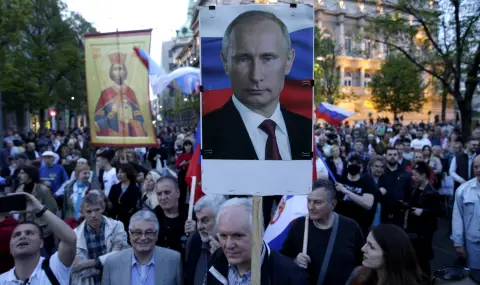Serbia is increasingly moving away from Russia economically, which is best can be seen in the energy sphere, as Belgrade turns to other gas suppliers, commented the Belgrade-based Beta Agency. The agreement on strategic partnership in the field of energy between Serbia and the USA can be interpreted as a move away from Moscow, which is a good economic and geopolitical move by the authorities in Serbia, analysts told the newspaper "Danas", commenting on the conclusion of this agreement, which was signed in Washington by Serbian Foreign Minister Marko Djuric and US Under Secretary of State for Economic Growth, Energy and Environment Jose Fernandez.
It can be assumed that Belgrade's economic distancing from Moscow is a consequence of the political decision of the top of the state, which in recent months has made moves that many claim are an indication that the President of Serbia, Aleksandar Vucic, is " moved to the side of the West“, notes Beta. For example, the purchase of French Rafale aircraft and the announced cooperation in the field of nuclear power plants, together with the arrival of French President Emmanuel Macron in Belgrade. Or the signing of the Memorandum of Understanding between the EU and Serbia on a strategic partnership for sustainable raw materials, battery production chains and electric vehicles in the presence of German Chancellor Olaf Scholz in Belgrade, recalls Beta.
Vucic's vague response to Putin's invitation to attend the BRICS summit in Kazan shows that rejecting the embrace of Russian President Vladimir Putin is not easy for Vucic, notes Beta. Although it initially appeared that he had refused, justifying himself with many commitments and guests, Vucic announced the final decision for mid-October. Vucic's connection with the "Russian world” - Deputy Prime Minister Aleksandar Vulin will most likely go to Kazan, although Putin warned Vucic in the invitation that the gas agreement expires in March, the Belgrade agency notes.
While cooperation with France, Germany and the EU was a main topic in Serbia, the strategic agreement with the US was not among the topics discussed in the media. Therefore, it is important what this treaty means politically and in the context of energy (in)dependence on Russia. Analyst Dragoslav Rasheta told the Danas newspaper that when we hear Western leaders and diplomats talking about Serbia's rapprochement with the West, among the reasons they cite Serbia's significant efforts to diversify its gas portfolio.
"Last year, the connector with Bulgaria was put into operation, which will supply Serbia with 400 million cubic meters of gas (the maximum flow will be about 1.8 billion) from Azerbaijan and the terminal in the Greek port of Alexandroupolis, while only a month ago, Minister Jedovic signed a memorandum of cooperation and construction of a gas connection with Romania, which will allow Serbia to import gas arriving from the direction of the Caspian Sea, Turkey and Greece," he reminded.
"And this shows that in this way Russia's influence in the region is reduced and Serbia continues to connect with the EU when it comes to energy infrastructure,'' Rasheta said.
"Serbia's contract with Russia expires in 2025 and it is in Belgrade's interest to reduce the dependence that currently exists as much as possible," the analyst pointed out.
Economist Saša Džogović stated for "Danas" that the signing of the agreement has an economic and geopolitical aspect.
"As we lack electricity and given that there has been no serious investment in our energy sector for years, any moves that lead to strengthening or revitalizing the electricity sector are welcome. Moreover, in the future, with climate change, we will have increasing consumption. We had a hot summer and used a lot of energy in the summer. With new investments, economic development, industrialization, there will also be greater consumption of electricity. In this sense, with the existing capacities, we will not be able to serve it, and certainly these investments are welcome", explains Jogovic.
As for the geopolitical aspect, Djogovic says that US involvement in energy projects is causing Serbia to slowly move away from Russian influence. He cited the examples of the Djerdap 3 hydroelectric plant and the solar park to be built.
"This shows that the American factor is entering the Serbian energy market,", Jogovic points out. And as an example of moving away from Russia, which, as he says, no longer has a monopoly in the supply of gas to Serbia, he gives the supply of gas from Azerbaijan through Bulgaria and the construction of an interconnection with Romania.
"In this sense, we see that energy projects are increasingly moving away from Russia. But we also see economic relations with Russia declining. Russia, for example, is now Serbia's seventh foreign trade partner. It used to be third, then fourth... Now we no longer import oil, gas imports have also decreased due to transferred stocks and favorable weather conditions (mild winter), stored quantities in Hungary, and gas prices are also lower. Besides, the rest we import from Russia is negligible and of no strategic importance. Exports to the Russian market are also declining because logistics costs are very high and transportation is complicated, so other markets are being found. "We see a process of decline in economic relations in all segments, including the army," Djogovic said.
He assessed the signed agreement with the USA as a good economic and geopolitical move.
